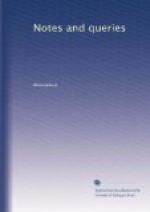Theophilus Higgons, whom the above initials represent, was himself a convert to the Church of Rome.
It may be worth while making a further note, that the copy of the pamphlet before me belonged to Camden, and is described in his autograph, Guil. Camdenj. Ex. dono Authoris. It forms one of a large collection of tracts and pamphlets, originally the property of Camden, which are now in the library of the dean and chapter here.
It is curious that another document quoted by Mr. Craik in the same volume (p. 286 note), seems to fix the meaning of a word or expression, of obscure signification, in the authorised translation of the Bible. In Judges, ix. 53., we read, “A certain woman cast a piece of a millstone upon Abimelech’s head, and all tobrake his skull.” I have heard some one, in despair at the grammatical construction of the latter clause, suggest that it might be an error for “also brake his skull;” and I have been told, that some printer or editor solved the difficulty by turning it into “and all to break his skull.” But in the Lieutenant of the Tower’s marginal notes on an inventory of the Countess of Hertford’s (Lady Katherine Grey) furniture, quoted by Mr. Craik from Lands. MS. 5. art. 41., he described the sparrer for the bed as “all to-broken, not worth ten pence.” There seems, therefore, to have been a compound, “to-breck, to-brake, to-broken” (perfrango), of which the word in the “Book of Judges” is the preterite. I may be exposing my ignorance, when I say, that the quotation in the Romance of the Peerage is the only other instance of its use I ever met with.
WILLIAM H. COPE.
Cloisters, Westminster
[The word “to-break,”
is not to be found in Nares.—Mr.
Halliwell, in his Archaic Dictionary, has
TO-BROKE, broken in
pieces:
“The gates that Neptunus made
A thousand wynter theretofore,
They have anon to-broke and tore.”
From the Gower MS. Soc. Ant. 134, f. 46.
The word occurs also in Chaucer (p. 549. ed. Urry):—
“To-broken ben the Statutes hie in heven;”
and also in the Vision of Piers
Ploughman (p. 156. ed.
Wright):
“The bagges and the bigirdles
He hath to-broke them all.”
And Mr. Wright very properly remarks, that “to- prefixed in composition to verbs of Anglo-Saxon origin, has the same force as the German zu, giving to the word the idea of destruction or deterioration.”]
* * * * *
NOTES UPON CUNNINGHAM’S HANDBOOK FOR LONDON.
Lambeth Wells.—A place of public entertainment, first opened in 1697. It was celebrated for its mineral water, which was sold at one penny per quart. At the beginning of the eighteenth century it was provided with a band of music, which played at intervals during the day, and the price of admission was threepence. A monthly concert, under the direction of Starling Goodwin, organist of St. Saviour’s church, Southwark, was held here in 1727.




